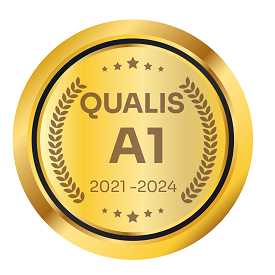Clasificaciones internacionales sobre la competitividad de las universidades en el espacio educativo global
DOI:
https://doi.org/10.22633/rpge.v26iesp.2.16564Palabras clave:
Ventaja competitiva, Educación, Interés nacional, ProfesoresResumen
Los rankings universitarios internacionales son un fenómeno relativamente nuevo en el espacio educativo global, sin embargo, a lo largo de los años, se han convertido en una herramienta autorizada para evaluar la efectividad del funcionamiento de las universidades. El presente estudio tiene como objetivo determinar el impacto de la posición de las instituciones de educación superior en los rankings internacionales sobre el nivel de su competitividad. Con base en el análisis de la literatura científica, los autores identifican los rankings universitarios internacionales que consideran más importantes y compilan una tipología de rankings universitarios internacionales. Sobre la base de una encuesta de expertos de 64 representantes de la gestión de las universidades rusas, se definen las ventajas competitivas de las universidades y se distinguen los rankings universitarios internacionales más populares. Los rankings internacionales sirven como una herramienta sofisticada para evaluar la competitividad de las universidades debido al reconocimiento de la universidad en el espacio educativo y científico global.
Descargas
Citas
ACADEMIC Ranking of World Universities, 2021. Available: http://www.shanghairanking.com/. Access: 10 Oct. 2021.
ALEKSANDROVA, I. B. et al. Influence of digital assistive technologies used in higher education on the development of individual educational strategies among students with disabilities. International Journal of Early Childhood Special Education, v. 13, n. 2, p. 1146-1153, 2021.
ALTBACH, P. G. The globalization of college and university rankings. Change: The Magazine of Higher Learning, v. 44, n. 1, p. 26-31, 2012.
CHERNYAEVA, E. P. et al. Didactic conditions for the building and implementation of individual educational trajectories of students using an interactive educational platform. International Journal of Early Childhood Special Education, v. 13, n. 2, p. 1183-1189, 2021.
DARAIO, C.; BONACCORSI, A. Beyond university rankings? Generating new indicators on universities by linking data in open platforms. Journal of the Association for Information Science and Technology, v. 68, n. 2, p. 508-529, 2017.
DARAIO, C.; BONACCORSI, A.; SIMAR, L. Rankings and university performance: A conditional multidimensional approach. European Journal of Operational Research, v. 244, n. 3, p. 918-930, 2015.
FAUZI, M. A. et al. University rankings: A review of methodological flaws. Issues in Educational Research, v. 30, n. 1, p. 79-96, 2020.
HÄGG, I.; WEDLIN, L. Standards for quality? A critical appraisal of the Berlin Principles for international rankings of universities. Quality in Higher Education, v. 19, n. 3, p. 326-342, 2013.
HARVEY, L. Rankings of higher education institutions: A critical review. Quality in Higher Education, v. 14, n. 3, p. 187-207, 2008.
JAROCKA, M. Transparency of university rankings in the effective management of universities. Business, Management and Education, v. 13, n. 1, p. 64-75, 2015.
KARASHCHUK, O. et al. Factors hindering retail development in Russia. In: INTERNATIONAL-BUSINESS-INFORMATION-MANAGEMENT-ASSOCIATION (IBIMA) CONFERENCE, 34, 2019, Madrid. Proceedings […]. Madrid, Spain: International Business Information Management Association, 2019. p. 7819-7824. Theme: Vision 2025: Education excellence and management of innovations through sustainable economic competitive advantage.
KOVALEVA, G. P.; DEKINA, A. I. Problems of innovative transformation of Russian higher education developmental education on the example of agrarian university. International Journal of Early Childhood Special Education, v. 13, n. 2, p. 1154-1159, 2021.
LUKMAN, R.; KRAJNC, L.; GLAVIČ, P. University ranking using research, educational and environmental indicators. Journal of Cleaner Production, v. 18, n. 7, p. 619-628, 2010.
MARCONI, G.; RITZEN, J. Determinants of international university rankings scores. Applied Economics, v. 47, n. 57, p. 6211-6227, 2015.
MARGINSON, S.; VAN DER WENDE, M. To rank or to be ranked: The impact of global rankings in higher education. Journal of Studies in International Education, v. 11, n. 3-4, p. 306-329, 2007.
MILLOT, B. International rankings: Universities vs. higher education systems. International Journal of Educational Development, v. 40, p. 156-165, 2015.
PEREZ-ESPARRELLS, C.; ORDUNA-MALEA, E. Do the technical universities exhibit distinct behaviour in global university rankings? A Times Higher Education (THE) case study. Journal of Engineering and Technology Management, v. 48, p. 97-108, 2018.
QS World University Rankings, [n.d.]. Available in: http://www.topuniversities.com. Access: 10 Oct. 2021.
ROTH, M. G.; MCANDREW, W. P. To each according to their ability? Academic ranking and salary inequality across public colleges and universities. Applied Economics Letters, v. 25, n. 1, p. 34-37, 2018.
SAISANA, M.; D 'HOMBRES, B.; SALTELLI, A. Rickety numbers: Volatility of university rankings and policy implications. Research Policy, v. 40, n. 1, p. 165-177, 2011.
TIMES Higher Education World University Rankings, n.d. Available: http://www.timeshighereducation.co.uk/world-university-rankings. Access: 10 Oct. 2021.
U-MULTIRANK, 2021. Available: https://www.umultirank.org/. Access: 10 Oct. 2021.
U-MАР. [n.d.]. Available: http://www.u-map.eu/. Access: 10 Oct. 2021.
WORLD Reputation Rankings, 2020. Available: https://www.timeshighereducation.com/world-university-rankings/2020/reputation-ranking. Access: 10 Oct. 2021.
ZAYTSEVA, A. A. Social behavior of university students in the educational sphere in the Rostov region and the Republic of Crimea: A comparative perspective. International Journal of Early Childhood Special Education, v. 13, n. 2, p. 319-326, 2021.
Publicado
Cómo citar
Número
Sección
Licencia
Derechos de autor 2022 Revista on line de Política e Gestão Educacional

Esta obra está bajo una licencia internacional Creative Commons Atribución-NoComercial-CompartirIgual 4.0.
Manuscritos aceitos e publicados são de propriedade da Revista on line de Política e Gestão Educacional. É vedada a submissão integral ou parcial do manuscrito a qualquer outro periódico. A responsabilidade do conteúdo dos artigos é exclusiva dos autores. É vedada a tradução para outro idioma sem a autorização escrita do Editor ouvida a Comissão Editorial Científica.











